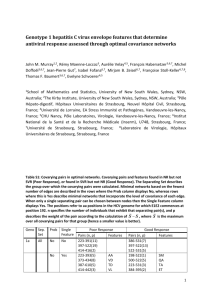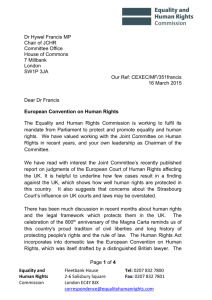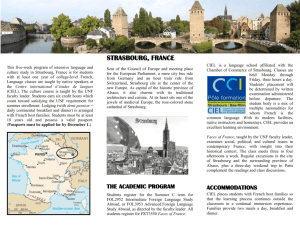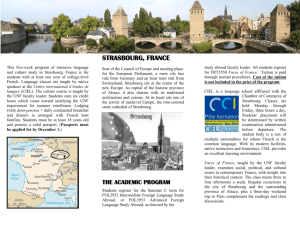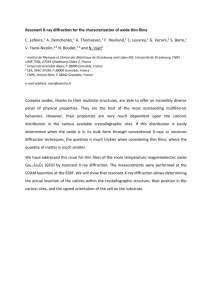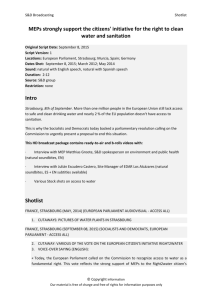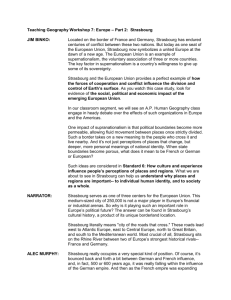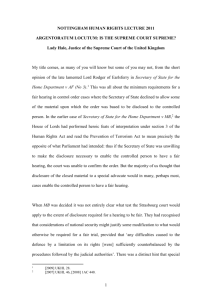Université de Strasbourg
advertisement
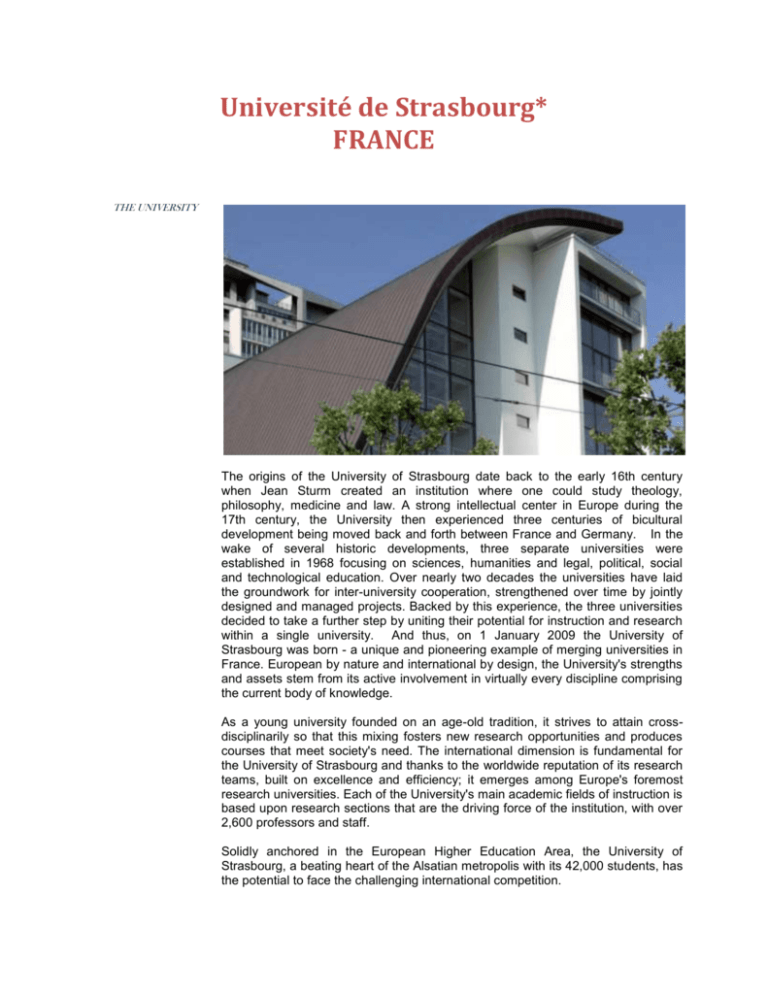
Université de Strasbourg* FRANCE THE UNIVERSITY The origins of the University of Strasbourg date back to the early 16th century when Jean Sturm created an institution where one could study theology, philosophy, medicine and law. A strong intellectual center in Europe during the 17th century, the University then experienced three centuries of bicultural development being moved back and forth between France and Germany. In the wake of several historic developments, three separate universities were established in 1968 focusing on sciences, humanities and legal, political, social and technological education. Over nearly two decades the universities have laid the groundwork for inter-university cooperation, strengthened over time by jointly designed and managed projects. Backed by this experience, the three universities decided to take a further step by uniting their potential for instruction and research within a single university. And thus, on 1 January 2009 the University of Strasbourg was born - a unique and pioneering example of merging universities in France. European by nature and international by design, the University's strengths and assets stem from its active involvement in virtually every discipline comprising the current body of knowledge. As a young university founded on an age-old tradition, it strives to attain crossdisciplinarily so that this mixing fosters new research opportunities and produces courses that meet society's need. The international dimension is fundamental for the University of Strasbourg and thanks to the worldwide reputation of its research teams, built on excellence and efficiency; it emerges among Europe's foremost research universities. Each of the University's main academic fields of instruction is based upon research sections that are the driving force of the institution, with over 2,600 professors and staff. Solidly anchored in the European Higher Education Area, the University of Strasbourg, a beating heart of the Alsatian metropolis with its 42,000 students, has the potential to face the challenging international competition. THE CITY STRASBOURG, A CITY OF ART AND HISTORY In this city located at the heart of economic trade and the flow of ideas, history can be seen in the wealth of its architectural heritage, particularly well preserved. The «Grande Ile», i.e. the entire Strasbourg city centre, was classified as a world heritage site by UNESCO in 1988. Strasbourg is one of the world’s only cities, along with Geneva and New York, to host international organizations without being a State capital. Host to the Council of Europe since 1949, it also plays host to the European Court of Human Rights and the European Parliament. Many other European organizations have decided to locate there such as the Eurocorps Command or the European Pharmacopoeia, Franco-German television channel Arte, as well as 30 consulates and 46 embassies. A pioneer in cross-border cooperation, Strasbourg is at the heart of the Eurodistrict, which nurtures Franco-German ambitions in the domain of transport, urban planning, education, health, etc. A city of many cultures, gastronomy and firmly rooted traditions, Strasbourg is also the number one student city for foreign students (more than 8,000), mixing cultures on a daily basis. The Lonely Planet guide cites it as one of the ten essential world tourist destinations. Its hospitality has been enhanced by its tourist appeal, notably with its famous Christmas market. Strasbourg is a pioneer city in terms of environmental preservation, and a very pleasant city to live in, with France’s largest and most widespread tramway network and its 500km of cycle paths, which also make Strasbourg France’s largest network in this domain. LOCATION GENERAL WEBSITE EXCHANGE STUDIES Strasbourg, France http://www.unistra.fr There are 38 faculties, schools and institutes at the University of Strasbourg that cover five areas of teaching. Arts, Literature and Languages Law, Economics, Management, Political and Social Sciences Social Sciences and Humanities Science and Technology Health APPLICATION APPLICATION FOR ADMISSION AS PART OF AN EXCHANGE PROGRAM 1. Verify with your University’s International Relations Department that there is a student exchange agreement with the University of Strasbourg in your discipline and inquire about admission conditions 2. Contact the person in charge of international exchanges within your domain to agree upon a course program 3. Submit a pre-selection application to your university of origin 4. If you are coming as part of an Erasmus exchange: go to the http://www.unistra.fr website, International section, to apply online 5. If you are coming as part of a bilateral exchange, the CREPUQ, MAUI or AEN program, you must ask the international relations department of the University de Strasbourg for a form and return it duly completed 6. Once the form has been completed and printed, have it validated by your university of origin and return it by - Erasmus: - 1st June at the latest for arrival un the 1st semester - 1st December for arrival in the 2nd semester - Other program: - Before 13 May at the latest for arrival in the 1st semester - 1st October for arrival in the 2nd semester 7. If your application is accepted, enroll and pay the fees in your institution of origin Contact - European students dri-students-exchange-in-europe@unistra.fr - Outside Europe students dri-students-exchange-outside-europe@unistra.fr APPLICATION DEADLINES Fall Semester: February 15th HOUSING In France, students can benefit from financial housing aid. Its amount varies depending on the situation. For more information, contact the student Agora (see details on page 25), or consult the website of the Caisse d’allocations familiales Spring Semester: September (CAF or Family Allowances Fund): www.caf.fr ACCOMMODATION ON CAMPUS The rooms, studios and 1-bedroom apartments proposed by CROUS are designed for limited budgets with basic comfort. There is a limited number of places available. If you are coming as part of an exchange program (Erasmus, CREPUQ, AEN, MAUI, Boston College), interuniversity exchange agreements, you can submit a housing application to the international relations department. Contact European students dri-students-exchange in-europe@unistra.fr Outside Europe students dri-students-exchange-outside-europe@unistra.fr IF you are coming in an individual capacity, you can ask for an international student social application between 15 January and 30 April (http://crous-strasbourg.fr). You will receive a form to be returned by 30 June. *NOTE: To apply for accommodation on campus or in the private property domain, you must give proof of a creditworthy person residing in the European Union who will act as guarantor for you. Margin: http://crous- strasbourg.fr PRIVATE RENTALS Rent in private accommodation is more expensive than the CROUS’ campus accommodation. Consult: individual property ads collected by CROUS, by student mutual insurance companies, by property agencies (who ask for additional fees) and classified ads in the local media. INSURANCE YOUR REGISTRATION WITH THE SOCIAL SECURITY Registration with the Social Security is compulsory for anyone residing on French territory for more than three months. For students, this registration is simultaneous with the administrative enrolment into university. In France, you must pay for your treatment, visits to the physician and medication. You will subsequently be partially reimbursed via the Social Security. The balance is your responsibility or can be reimbursed by complementary health insurance. However, your situation depends on your age, status and nationality; inform yourself promptly. http://www.securite-sociale.fr EU STUDENTS Before leaving, you must ask the social protection services of your country of origin for the European health insurance card. STUDENTS FROM OUTSIDE THE EUROPEAN UNION You must register with the French student Social Security system. Annual membership amounted to €200 in 2010-2011. Special cases • Under 20 and benefiting from parental social protection (SE form) in your country of origin: you must present a birth certificate authenticated by your municipality of birth, with a translation if the document is not in French or English. • Over 28: you cannot benefit from the student scheme of the Social Security and you must take out a personal insurance policy. Under certain conditions, you can benefit from the Couverture Médicale Universelle (CMU or Universal Medical Coverage). COMPLEMENTARY MUTUAL INSURANCE Compulsory social security schemes only reimburse part of health expenses, depending on the nature of the treatment. Joining a complementary mutual insurance company is not compulsory but guarantees better reimbursements. You can join at the time of administrative enrolment. EXPECTED COSTS French law stipulates that a foreign student must prove that they dispose of a monthly minimum of €430 in France without working. The existence of these resources can be proven by: • a scholarship certificate; • payment by a creditworthy guarantor established in France; • an automatic standing order. THIS BUDGET IS NOT SUFFICIENT; A STUDENT’S MONTHLY BUDGET IS AT LEAST €600. Indicative budget for the 1st month (set-up expenses): up to €1,600 • rent: €300 minimum (€160 in campus accommodation) • deposit for your accommodation (1 month’s rent): €300 (€150 in campus accommodation) • annual housing insurance: €50 • enrolment fees: €171 to €350 depending on the education level • registration with the Social Security: €195 • mutual health insurance company: €60 to €300 • other set-up expenses (telephone, electricity, etc.): €100 ADDITIONAL INFO Visa application Documents required for a visa Residence Permit Minimum Financial Support Temporary Work Permit Contact Nathalie Hennebelle Tél : +33 (0) 3 68 85 60 16 Fax : +33 (0)3 68 85 65 11 Courriel : hennebelle@unistra.fr Full Student Guide available at: https://www.unistra.fr/fileadmin/upload/unistraen/home/UDS_guide_etudier_a_strasbourg_internet.p df * Information subject to change
